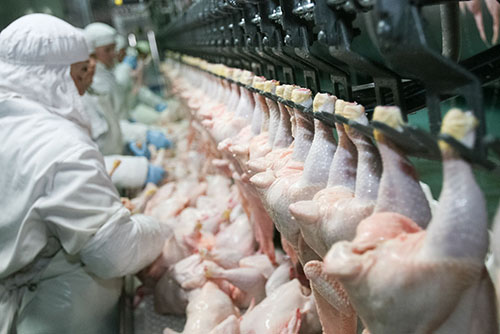Edgar Brandt
Namibia should prioritise institutionalising its own trade regulatory body to align implementation of the Southern African Customs Union (SACU) Agreement and other trade agreements for implementation such as the African Continental Free Trade Agreement (AfCFTA). This recommendation follows cases of poultry dumping in the SACU market that was confirmed by the International Trade Administration Commission (ITAC).
IITAC, the de facto trade regulator for the SACU market, concluded a preliminary investigation of dumping of poultry products into SACU.
“After considering all interested parties’ submissions and comments, ITAC made a preliminary determination that the subject products (HS: 0207.14.9) originating in or imported from Brazil, Denmark, Ireland, Poland and Spain are being dumped into the SACU market, causing a material injury and a threat of material injury to the SACU poultry industry,” reads a report compiled by Maria Immanuel, Technical Advisor at the Namibian Agricultural Trade Forum (ATF).
As a result, ITAC requested the relevant authorities to impose provisional measures (anti-dumping measures) on imports of the subject products for a period of six months. The South African Revenue Services (SARS) gazetted the measure on 4 March 2022, to be implemented with retrospective effect from 17 December 2021 up to and including 14 June 2022. SARS by implication also manages the implementation of the SACU’s customs tariff system.
Meanwhile, Immanuel explained that a trade regulatory body will allow Namibia to set up and build capacity in trade remedy matters, which include trade investigations for dumping and countervailing measures (a surge of imports upon opening the domestic market to products under a trade agreement). The trade body will also enable coordinating tariff setting and implementation issues, as well as determination of rebates, with ITAC.
“A trade regulator body provides a platform to the private sector to access in a transparent manner SACU rebates and drawbacks used primarily as intermediate inputs in the manufacturing process. The body will also balance private sector support within the customs union to maximise the benefit of the SACU Agreement and other international trade agreements already in place,” Immanuel stated.
She continued that Namibia’s envisaged ‘Board of Trade’ has taken too long to enact, thereby not only delaying the establishment of the SACU Tariff Board and joint decision-making on SACU tariff matters, but also pushing Namibia further behind with achieving her Vision 2030 industrialisation goals.
In trade terms, dumping occurs when the exporting country sells the subject product in SACU at prices less than the normal value in the countries of origin. An anti-dumping action is normally initiated by domestic producers through submission of an application to ITAC. Once ITAC accepts the application, the investigation is conducted in accordance with the ITAC Act and the International Trade Administration Commission Anti-Dumping Regulations (ADR) read with the World Trade Organisation (WTO) legislation.
In this poultry dumping application, it is further alleged that because of dumping of the subject products from the countries of origin, the SACU industry was experiencing material injury in the form of; price undercutting, price depression during the 2017/18 – 2018/19 period, price suppression, decline in profit, decline in return on investment, ‘decline in capacity and capacity utilisation and increase in inventory.
Eight participating South African producers on behalf of the SACU market submitted the poultry dumping application and information was verified between 1 and 15 December 2020, while ITAC accepted the application as properly documented on 13 January 2021.
ITAC then initiated a preliminary investigation into the alleged dumping of frozen bone-in portions of fowls originating in or imported from Brazil, Denmark, Ireland, Poland and Spain.
“The South African poultry sector is deemed sufficiently large to meet this requirement on its own without the need for poultry industries in other countries in SACU to be taken into account. Whether Namibia and other SACU members (Botswana, Lesotho, Eswatini) participate or not, the outcome and its implementation directly affect all SACU members since SACU has a common external tariff making it a common customs territory or in simple terms, one market. So, by implication, importers in Namibia will have to pay the applicable anti-dumping duties when importing from those countries, while domestic producers will also benefit from the protection provided by the additional duties,” the report reads.


